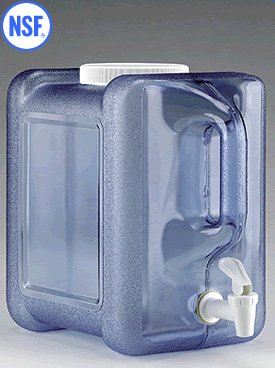I think that we sometimes think that natural disasters only happen to people in places like Haiti, Chile, or Southeast Asia.
Hurricane Sandy showed just how wrong I was. All of us need to be prepared. Hurricane Sandy was just a reminder, but not even one that I really needed. When we lived in D.C., we had a bad storm that took out power to the the water treatment plant. Although we had water out of the tap, it wasn't safe to drink for a few days. Boy was I glad that we were prepared with drinking water in our emergency storage.
I bet that if those New Yorkers had been a little more prepared, they would not have been Dumpster Diving for food! So here are five simple things that you can do to be prepared for a natural disaster or any other problem:
#1 - Water is Life
 |
| Costco sells water bottles with a spigot on them |
Government sources (hold your sarcasm) suggest having a gallon of water per person per day for drinking and other purposes. You should probably plan on 3 days worth per person at a minimum. A week's worth would be better. Plan accordingly.
#2 - Eat to Live
We live in so much abundance that one of the major issues facing our country is childhood obesity. Some countries would kill for that problem. But in an emergency, food could be much more scarce. Just see the headline above.
Make sure to have some food available. It should be food that: (a) you are used to eating; (b) you like to eat; and (c) doesn't require much preparation since you may not have electricity or heat to cook it with. It's best to rotate stuff through your food storage so that it's always fresh.
| Typical Food Storage |
Sure canned wheat is great, but in an emergency, do you really think you're going to pull out your electric grinder and start making flour? If so, you're a better person than I am and that's awesome until the power goes out. Then you've got a bunch of wheat kernels to chew on. Yum!
Instead, think of simple things that keep well, store well, and will get eaten. (Ramen noodles? Pre-packaged meals that just need hot water to be ready...) Also feel free to include a Costco box of Oreos as part of your food storage planning as well. Just because there's an emergency doesn't mean you have to skip dessert! (And there's no reason you can't have some comfort food!)
#3 - Light Up the Night
 |
| Flashlights don't need to be big! |
I remember the culture shock of coming home from the airport--my first time in the United States in two years--and seeing all the lights on at night and wondering how often the power goes out. Then I tried to wrap my head around the fact that, for the most part, the power really doesn't ever go out in this country! We take it for granted that when we walk into a dark room and flick that switch, the power is coming on!
But in an emergency, we can't take that for granted. Make sure that you have a flashlight ready, spare batteries, and that you know where they are. Also, put a mini flashlight in your car as well (and in your spouse's car!).
Flashlights are much better than candles. If there is a gas leak, you are not going to want any open flames around!
#4 - Turn it Off!
 |
| Your Gas Meter |
If your gas pipes break, that can cause a major fire. In Hurricane Sandy, there was a neighborhood on Long Island that had over 110 homes burn. Probably because a gas line broke and started the blaze. You should show everyone in your house where the turn off valves are at and how to use them.
#5 - Have a Plan
The scriptures tell us that if you are prepared, you shall not fear. Talk to your kids about what to do and where to meet in the event of an emergency so that everybody is on the same page. If your kids are in Cub Scouts, this is probably a requirement for one of their badges anyway. But nothing could make a tragedy worse than losing a human life. If you can game plan ahead of time the proper exit routes from your house and where to meet, you will at least maximize your chances of keeping everyone in your family safe. And prevent an accident or disaster from becoming a catastrophic tragedy.
Now I just need to make sure that my kids know what the plan is!
| Commuters scramble for gas... |
ONE MORE THING: Make sure that you fill up your car's gas tank before the storm--not after! Reports out of New York and New Jersey show that many gas stations are running out of fuel and, those that have fuel, may not be able to work the pumps due to the power outages. If you have to get out of town, you're going to have a lot better luck trying to do it on a full tank of gas!


This is all such good advice! When we lived in Darwin and had a Cyclone season ever year I had a great emergency survival kit (and yes it contained some very nice chocolate because chocolate makes you happy and when your house gets blown away ... you want something to make you happy lol).
ReplyDelete